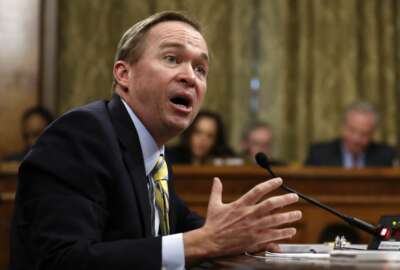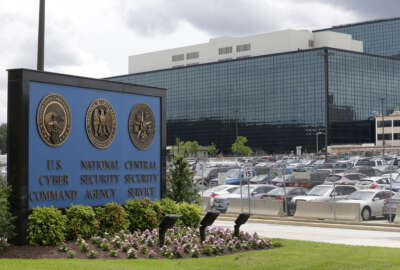
Pay freeze for VP, senior political appointees to stay in place for 2018
In today's Federal Newscast, unless Congress makes a change in any upcoming spending bills, the pay freeze placed on the Vice President and other senior political...
To listen to the Federal Newscast on your phone or mobile device, subscribe on PodcastOne or iTunes.
- The pay freeze on the vice president and certain senior political officials will stay in place in 2018, unless Congress says otherwise in an upcoming spending bill. The current continuing resolution holds a pay freeze from 2013 levels. The Office of Personnel Management said it doesn’t know how long that freeze would remain. Congress must change the pay rate for the vice president and other senior political officials in its next appropriations bill to undo the 2013 freeze. (Chief Human Capital Officers Council)
- The American Federation of Government Employees joined 95 lawmakers in their call to oppose any more cuts to federal employee pay and benefits to offset increases in discretionary spending. AFGE fears Congress would impose decreases to federal employee pay and retirement to offset the cost of increasing spending caps. Members of Congress wrote to House Speaker Paul Ryan (R-Wis.) and Minority Leader Nancy Pelosi (D-Calif.). House and Senate leadership are still negotiating over how they’ll lift sequestration caps for fiscal 2018 and 2019. (American Federation of Government Employees)
- The President’s Pay Agent signed off on a recommendation to add Birmingham, Alabama, and San Antonio, Texas, as their own separate locality pay areas. The Federal Salary Council originally recommended the move in 2016. The President’s Pay Agent’s approval begins the long regulatory process required before any new locality pay areas become official. (Federal News Radio)
- The Air Force said it was cutting back on administrative overhead by ending the requirement for new enlistees to go through performance reviews. From now on, enlisted personnel won’t face their first formal, documented review until they’ve been promoted to the rank of senior airman, or until they’ve served for three years. The policy change appears to acknowledge those reviews served little purpose, since most promotions are automatic in the first years of a service member’s career. Officials said it was part of an effort to cut down on unnecessary paperwork within Air Force squadrons. (Federal News Radio)
- The Census Bureau is in the home stretch in preparing for the 2020 count, but who’s in charge? Sens. Heidi Heitkamp (D-N.D.) and Tom Carper (D-Del.) called on the president to nominate a new Census director and deputy director. The last director, John Thompson, stepped down last June after four years on the job. The Census is running behind schedule for deploying some new technology. The bureau originally planned to run field tests in West Virginia, Washington State and Rhode Island. Due to budget shortfalls, however, the agency will only run one test in Rhode Island this April. (Federal News Radio)
- A U.S. Postal Service executive announced he will retire after more than 40 years with the agency. James Cochrane will step down as USPS’ chief customer and marketing sales officer. During his time at the Postal Service, Cochrane helped develop an intelligent barcode system used to track mail and packages, and helped pioneer flat-rate shipping. Prior to that, Cochrane served as the Postal Service’s chief information officer and advocated for better data analytics at the agency. (U.S. Postal Service)
- Mandatory reporting of cyber attacks is coming for one critical infrastructure sector. The Federal Energy Regulatory Commission is concerned that electricity and power companies aren’t reporting the true scope of cyber attacks against the power grid. So FERC issued a notice of proposed rulemaking to revise the Critical Infrastructure Protection Reliability Standard. In the notice, FERC asked the North American Electric Reliability Corporation (NERC) to submit modifications to broaden the mandatory reporting of cybersecurity incidents that attack the electronic security perimeter or associated electronic access control or monitoring systems. Comments are due by mid-February. (Federal Energy Regulatory Commission)
- Members of the White House staff will no longer be allowed to use their personal mobile devices at the White House. Press Secretary Sarah Huckabee Sanders announced the new policy will start next week. Sanders said the plan has been in works for the last six months. One of the main reasons for the decision is to make sure the administration complies with the Presidential Records Act. Bloomberg reported another reason is personal mobile devices are a security risk to White House networks and systems. (White House)
- One federal regulator has decided crypto-currency markets need closer attention. The Commodity Futures Trading Commission joined the SEC in keeping a closer eye on markets for virtual currencies and virtual currency derivatives. Among the dangers, CFTC chairman Christopher Giancarlo listed cybersecurity risks to trading platforms, speculative risks because of high volatility, and multiple fraud risks. The agency declared cryptocurrencies commodities under its authority back in 2014. Giancarlo plans to convene a Jan. 31 meeting of its market risk advisory committee. (Commodity Futures Trading Commission)
Copyright © 2025 Federal News Network. All rights reserved. This website is not intended for users located within the European Economic Area.
Eric White
Eric White is news anchor and Federal Drive producer at Federal News Network.
Follow @FEDERALNEWSCAST
Related Stories
Related Topics





